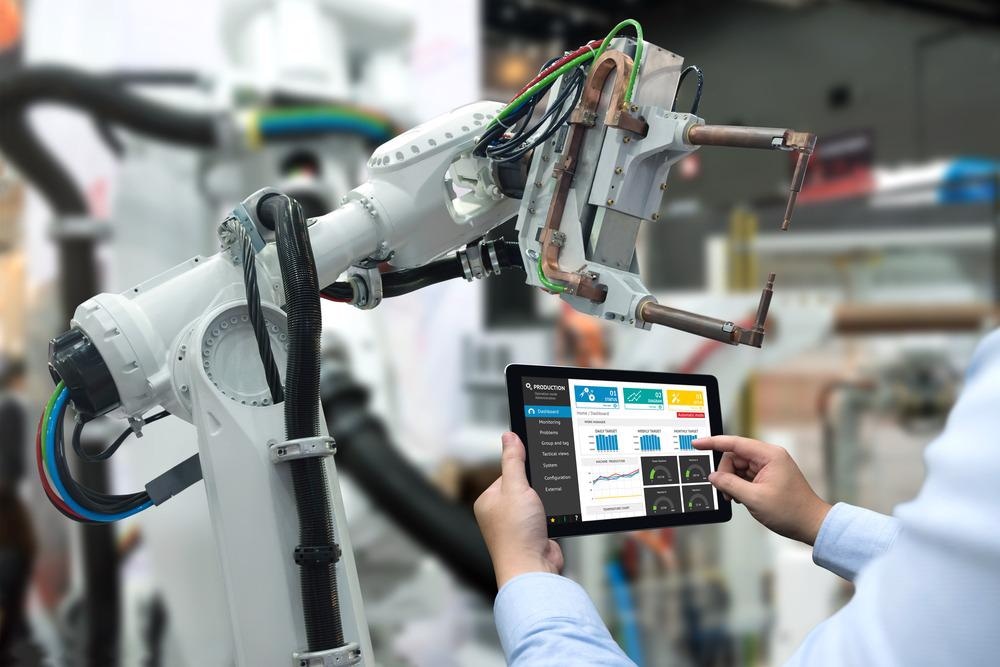In the manufacturing business, technologies are often run for decades, requiring ongoing rebuilding, expansion, and modification. The need to improve operational efficiency is as ancient as the manufacturing business itself. Through a variety of creative products and tools, the digital technology of the industry generates new opportunities for more favorable operating setups.

Image Credit: Zapp2Photo/Shutterstock.com
Progress in Recent Years
In the past few years, the production systems have achieved great strides in terms of sustainable development and efficiency. For instance, in the chemical sector, supply and cost-effectiveness, as well as processing and workplace health, have gradually and significantly improved via the invention and deployment of superior manufacturing techniques. This was largely accomplished via improved chemical and technological knowledge and application at the local stage.
However, due to the relatively lengthy lifespans of conventional chemical industries, it is still usual to discover manufacturing techniques that are established in past and are quite outdated according to modern needs. Traditionally, a large amount of data is gathered and kept, but it is dispersed in silos with no inner or bilateral connectivity, making it inaccessible for a comprehensive review.
Even though considerable understanding has been developed for current facilities in systems integration, including presumably modeling techniques, a constant translation of this information to manufacturing across plant operation, building, and testing. Finally, even when control of operations is effectively transferred from design to manufacturing, it is often lacking in the verification of that information using readily accessible performance data. Nonetheless, it is not mainly a technological issue, since big data analytics and multiple cloud-based products have built an agile approach toolkit in recent times that allows application-specific deployment in extremely short time frames.
Advantages of Digitization
Digitization has a lot of benefits. The pace of production is the first element we're witnessing as digitalization changes the industrial business. Manufacturers must find the best approach to respond in the face of constantly changing customer preferences and an increased tempo of new product inventions. Makers, in particular, will be able to act faster from concept to flooring and back again when modifications from the engineering group are received.
To begin, when devices are developed, they are outfitted with sensors. The sensors will therefore offer constant input across the industrial distribution network. The production line may be adjusted in response to dynamic information like servicing needs and fatigue. We may ultimately reach a stage where robotics and AI constantly refine current designs in response to dynamic events, freeing designers to concentrate on innovative products.
For a range of factors, digitization may provide much-needed respite to global industrial production networks. For starters, information is more easily shared. It is much more convenient to exchange files over a network than it is to transmit documents through electronic mail. Even if the documents are emailed and later printed, the organization is exposed to another data transformation and hence additional threat. Digitization may aid in both basic transparency and procedure compliance—for instance, declaring that every column on a form must be filled out.
Digitization will not just make production more efficient—we have already seen it drive creativity via quick product development. Improved data exchange across departments, companies, and software suites through APIs will only accelerate this development rate. Corporations are ready to capitalize on new products, market possibilities, and consumer needs like never before by breaking down silos and allowing data to be accessible in real-time, wherever in the globe.
Challenges Faced
The digitizing process is also fraught with difficulties. There are impediments in the developed IT and process ecosystems. IT, therefore, stifles creativity since consolidating efforts might find unanticipated risks late in the process, making estimates harder. The appropriate fit/gap assessment in the perspective of a feasible business structure is often neglected, and any threats to the program's quick profitability are disregarded.
Digitization in the Chemical Industry
The chemical industry is complex, with several sub-sectors facing varying challenges. With the emergence of COVID-19, certain sub-sectors witnessed market fall, such as those handling the automobile, aviation, and fossil fuel industries, whereas others witnessed growing demands and shifts, such as those providing the pharmaceutical industry. As a result, the sector's key priorities for digitization differ substantially. Large facilities, for instance, are interested in boosting output speed, while specialty chemicals with small lots but larger profit ratios are interested in improving quality.
The COVID-19 epidemic makes it critical for plant operators to adopt digital changes, and the gap between digitally mature organizations and those still trying to attract the appropriate people and comprehend the advantages of digitalization is growing all the time.
Latest Advances
In the latest article published on the website Enginess, it discusses how plants that embrace digital capabilities quickly for monitoring systems, supply chain accessibility, waste reduction, optimization of manufacturing, elevating their tolerability, and creating new opportunities will result in higher revenues and extra sales, but those that wait longer may fail indefinitely. When procedures are digitized, new advances in machine learning, Artificial Intelligence, the Internet of things, digital twins, and a holistic, all-encompassing creation of products may appear.
More from AZoM: How is the Digital Transition Benefiting the Planet?
References and Further Reading
Lade, O., 2019. Digitalization in the process industries: Humans as success factor in production. [Online]
Available at: https://www.capgemini.com/2019/10/digitalization-in-the-process-industries-humans-as-success-factor-in-production/
Peleg, L. A., 2021. Digital Transformation & Industry 4.0 in the Chemical Industry. [Online]
Available at: https://www.precog.co/blog/digital-transformation-industry-4-0-in-the-chemical-industry/
Team, E., 2021. How Digitization Is Transforming Manufacturing Industry. [Online]
Available at: https://www.enginess.io/insights/how-digitization-is-tranforming-manufacturing-industry
Disclaimer: The views expressed here are those of the author expressed in their private capacity and do not necessarily represent the views of AZoM.com Limited T/A AZoNetwork the owner and operator of this website. This disclaimer forms part of the Terms and conditions of use of this website.